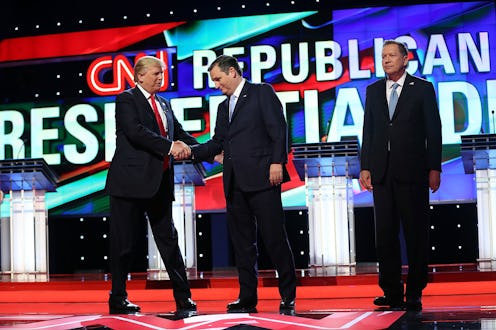News
It's The Most Dramatic Election Yet
Two months into the 2016 primary season, we have front-runners for both the Democratic and Republican nominations: former Secretary of State Hillary Clinton and Donald Trump, respectively. But it's too early in the race to rule out the possibility that Sen. Bernie Sanders or Sen. Ted Cruz could come back from behind. But another question looms large in this race, especially on the Republican side, where three candidates remain in the race splitting up the delegate distribution: What happens if nobody wins the primaries?
First, let's consider why this might happen. In both parties, a candidate must secure at least half of the available delegates in order to get the nomination — not just more delegates than any other candidate, but more than half. The Republican nominee needs 1,237 delegates or more, and the Democratic nominee needs at least 2,382.
Right off the bat, we can see how having three candidates in a race can cause a situation in which no one candidate secures more than half the delegates. Real Clear Politics reported that Trump has 736 delegates, Cruz has 463, and Gov. John Kasich has 143. Though Rubio has suspended his campaign, the majority of his 171 delegates will remain bound to him at the Republican National Convention in July for the first round of voting.
Trump needs 501 of the remaining 943 delegates which, if the race continues as it started, he will get. But, if Cruz comes up from behind, or if he and Kasich play keep-away from Trump successfully, the delegates could very well show up to the convention without any one candidate having secured a majority. Then we'd have what's called a brokered convention. If no candidate wins after the first round of voting, three-quarters of the delegates become unbound from the results of their states' caucuses or primaries, and can vote for whomever they want, Politico reported.
There is one Republican National Committee (RNC) rule that could limit delegates' options: Rule 40, which dictates that, in order to be eligible for votes at the convention, a candidate must have won a plurality of votes in eight states during the primaries. That rule would likely nix Kasich from consideration. However, the RNC could up and change the rule before the convention, opening up the floor not only to Kasich, but anyone. If no candidate in the race earns a majority after several rounds of voting, someone who hasn't even been running could be entered into the race for consideration. Basically, if a brokered convention happens, all hell could break loose.
So, with only two candidates on the Democratic side, things will be much more straightforward, right? Possibly not. There are over 700 "superdelegates" on the Democratic side, delegates who are unbound from primary votes and can vote for whomever they want, comprising about 15 percent of total delegates available. The supers' picks aren't official until they cast their votes at the Democratic National Convention. If Clinton and Sanders end up in a very close race with bound delegates, the supers could be responsible for getting one candidate past the majority threshold.
It's hard to say how likely or unlikely these scenarios are. All we know now is that they are possible. If there's no clear winner after the primaries, it will add a ton of significance to both parties' conventions in July, we can be sure of that.
